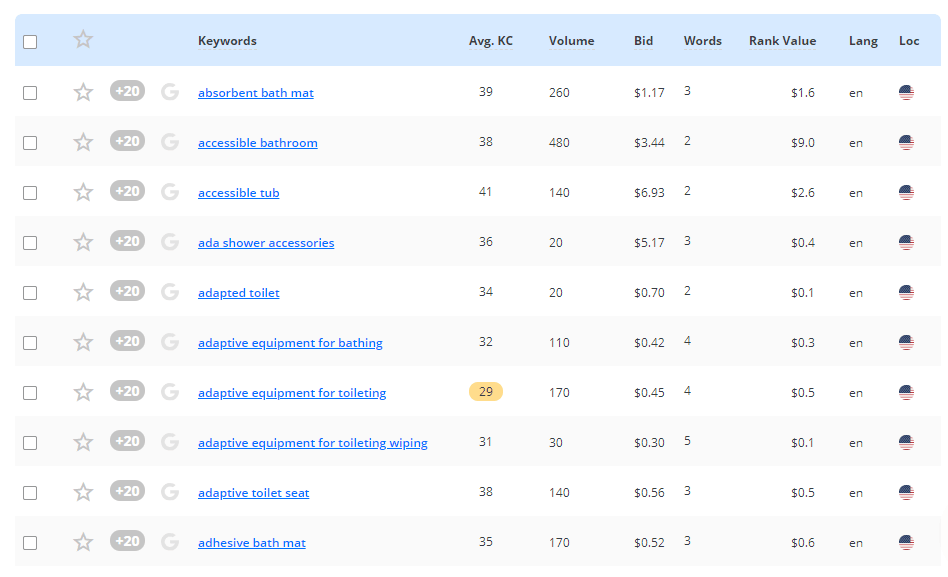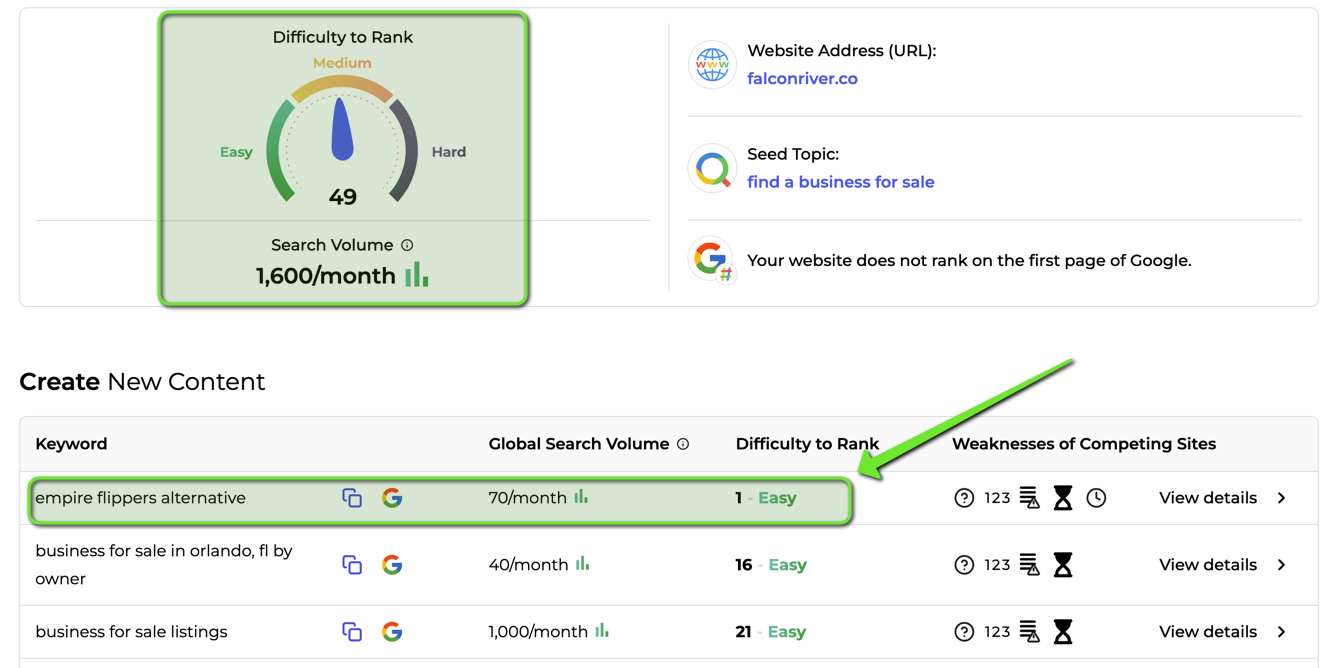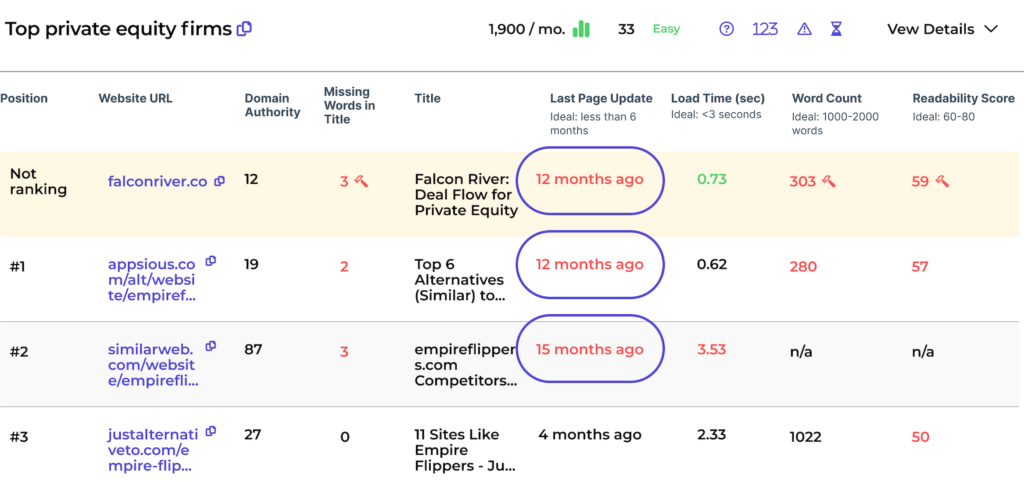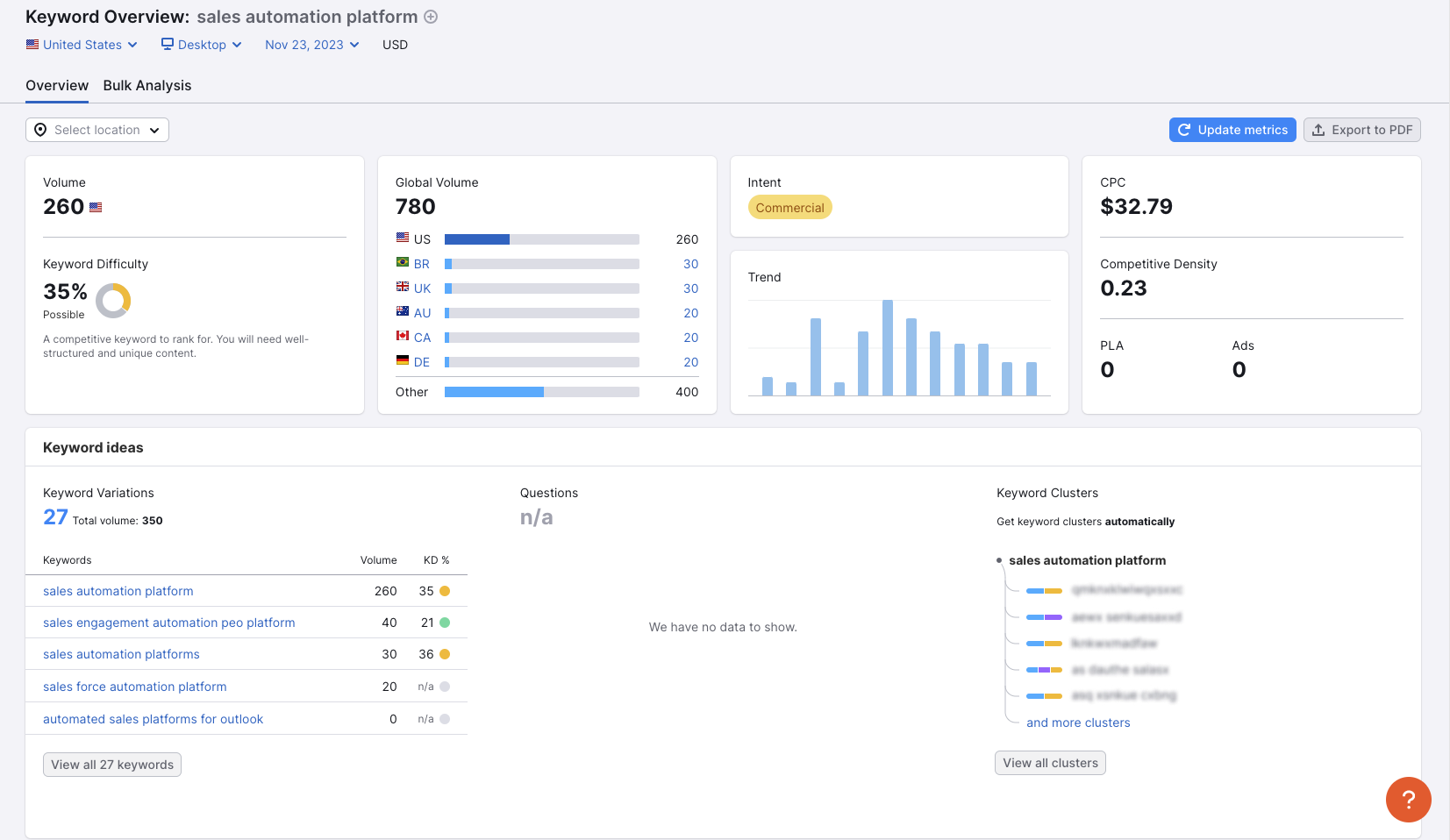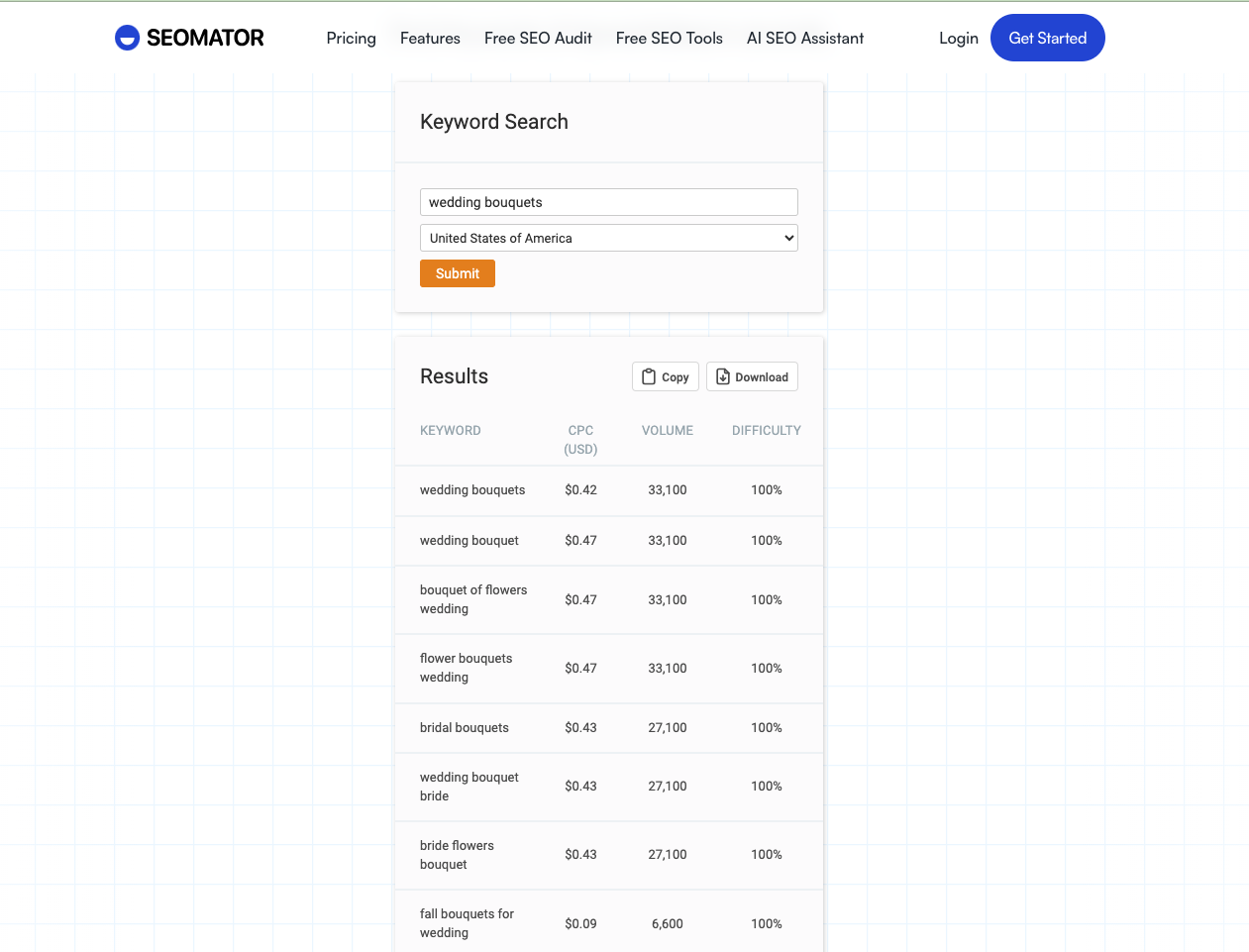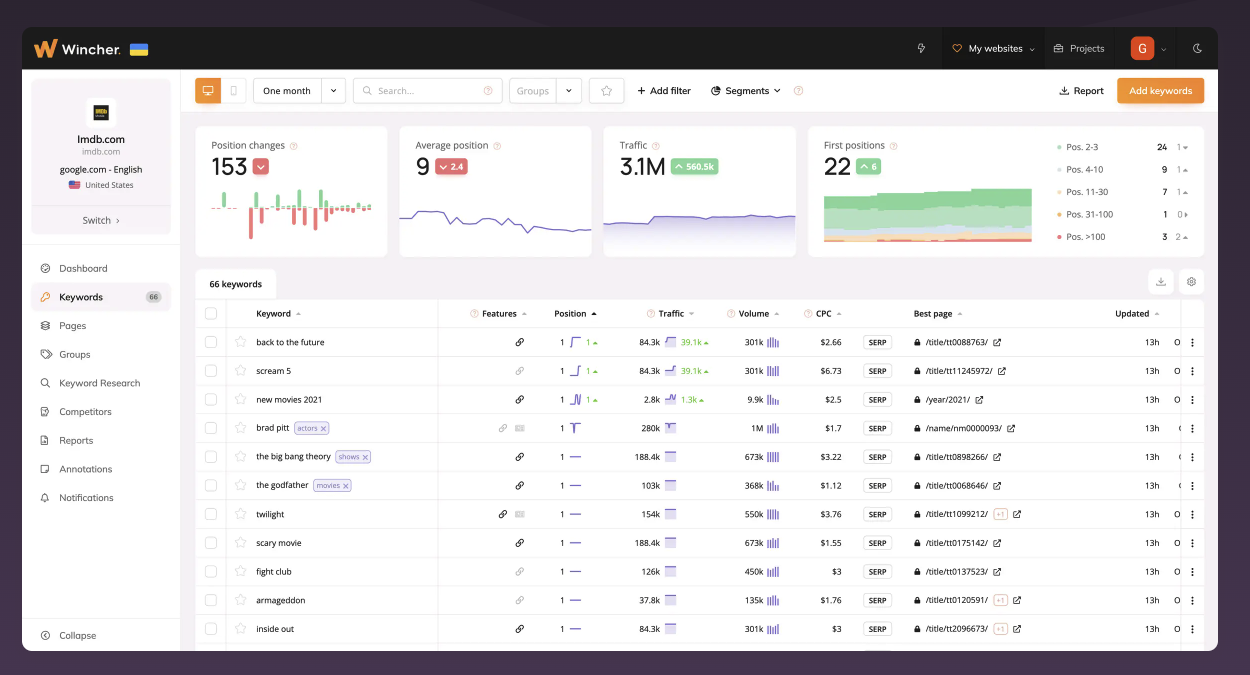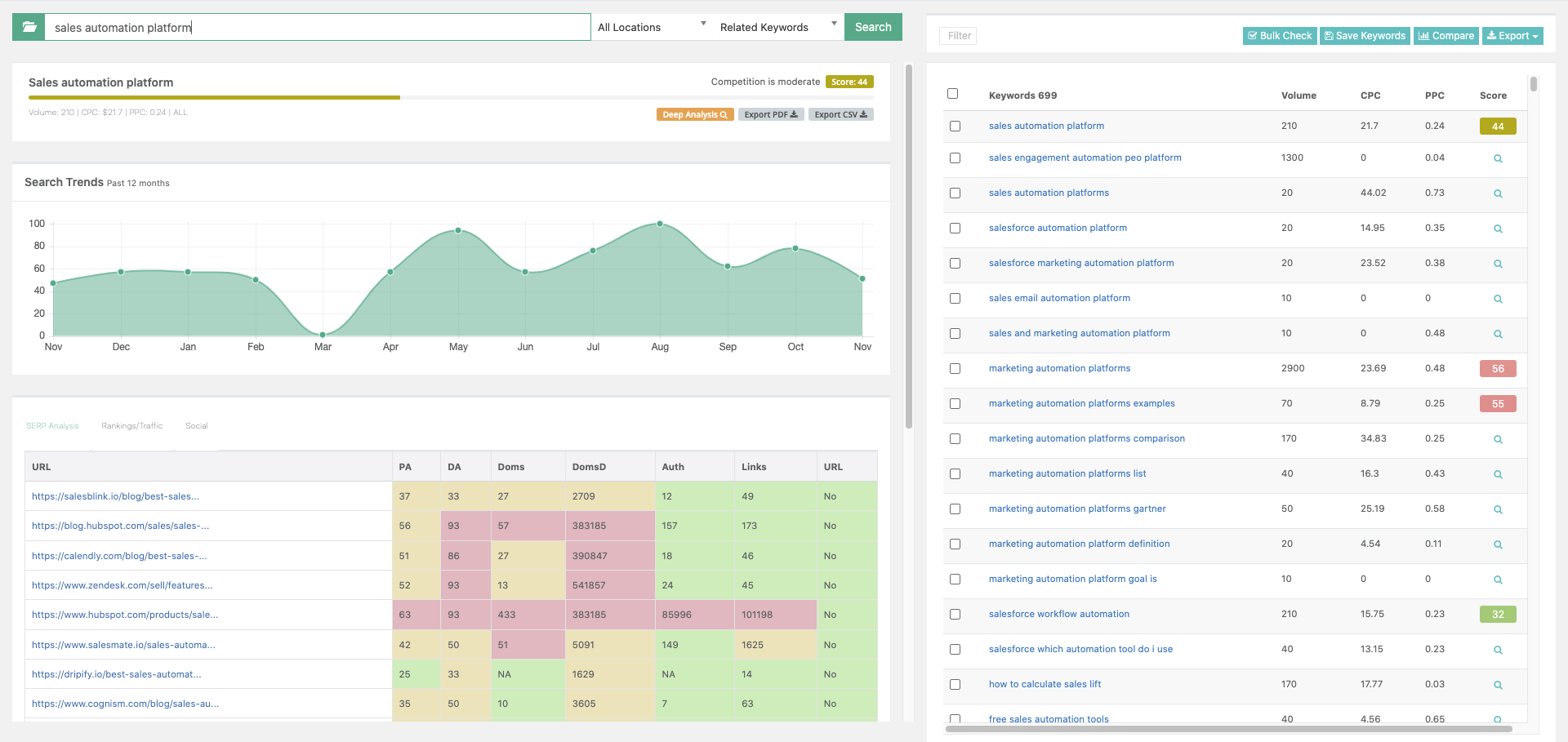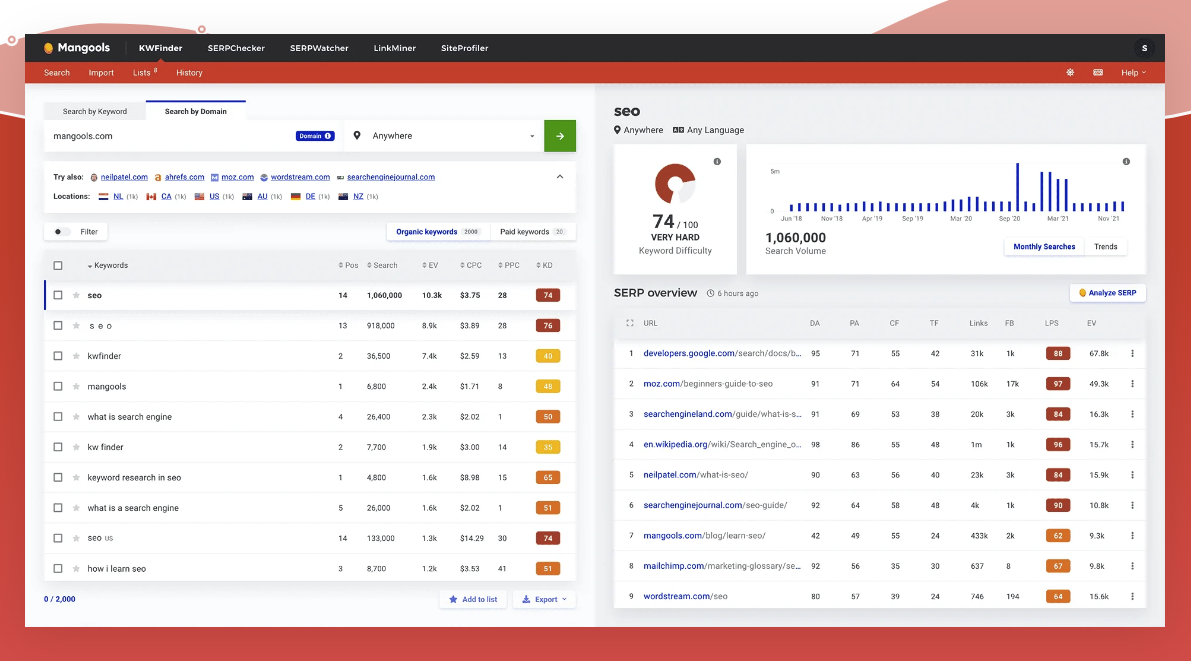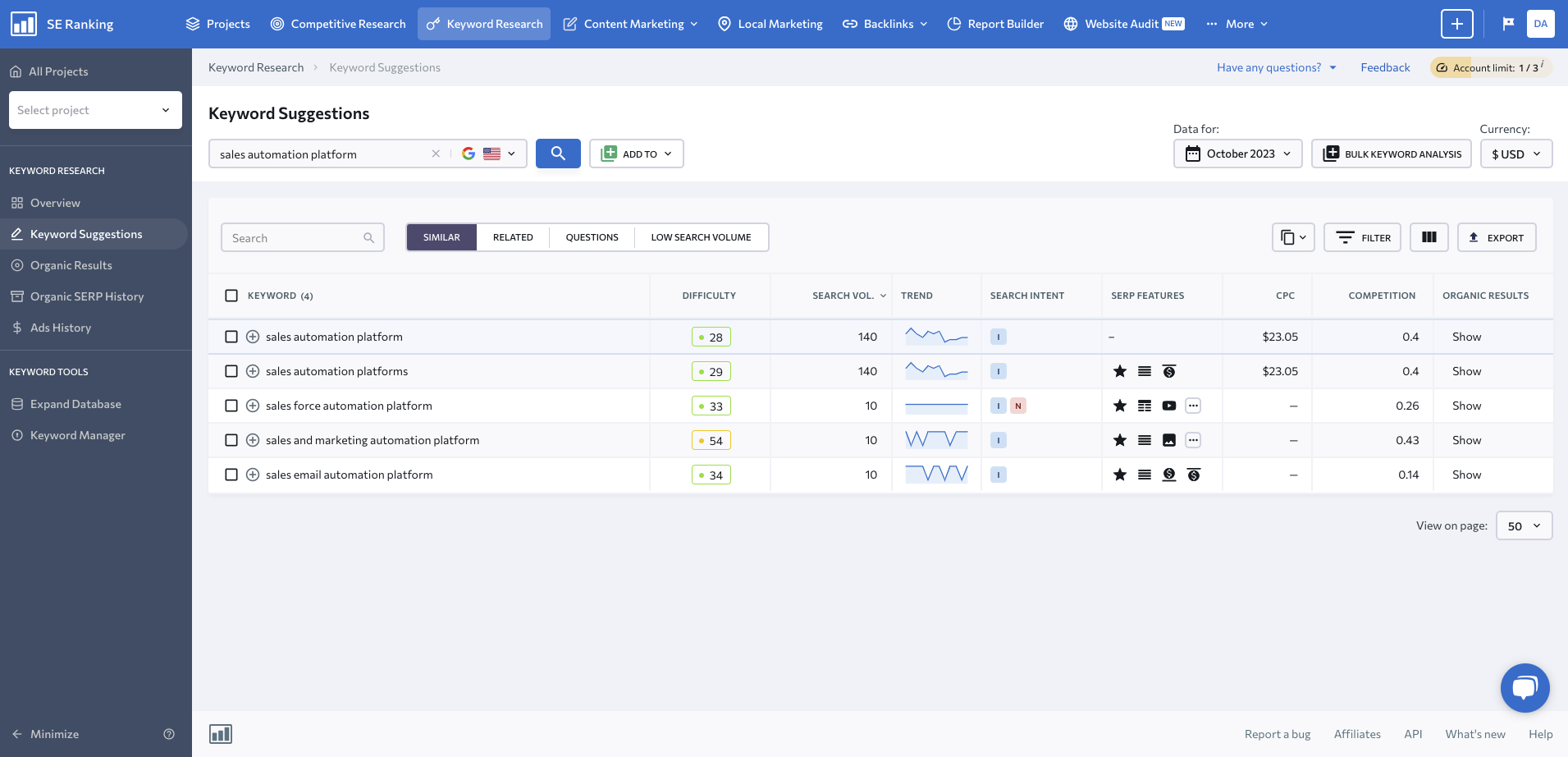Long Tail Pro is a keyword research tool to find low competition keywords in bulk based on a seed keyword you input. LongTailPro website and software went down and stopped operating on June 5, 2024. As of March 3, 2025 the website and the tool is no longer operational and not accessible and the business will not continue to operate.
- LongTailPro was founded and launched in 2011 by Spencer Haws
- LongTailPro has been used by 70,000+ businesses
- On Feb 1, 2016 the founder sold the company to a private equity group
- In March of 2024 LongTailPro website went down and based on no response from their support seems to have shut down
In this article we’re going to share our top 8 powerful LongTailPro alternatives which can replace the platform for you at a fraction of the cost.
Here is a quick recap of the top 8 LongTailPro alternatives we’ll review in this buyers guide:
- TopicRanker: If you’re looking for long tail keywords based on specific problems in SERP
- Semrush: If you’re looking for a comprehensive, well-known tool
- Seomator: If you’re looking for a suite of free SEO and keyword tools
- Keywords Everywhere: If you’re looking for a browser extension to uncover auto suggest keywords
- Wincher: If you’re looking for a rank tracker
- Keysearch: If you’re looking for a basic inexpensive solution
- KWFinder: If you’re looking for a basic long tail keyword research
- SE Ranking: If you want keyword suggestions and grouping
If you don’t feel like reading the article, here’s the short version of our analysis of LongTailPro G2 reviews data:
- As of June 5, 2024 Long Tail Pro is no longer accessible via their website
- LongTailPro had a rating of 4.3 out of 5 stars on G2 and 2.4 out of 5 stars on TrustPilot.
- Users loved Long Tail Pro for quick and easy way to find long tail keyword research in bulk.
- Major Drawback: Customers disliked the low limit on keywords you can input
- Major Drawback: Limit on seed keywords you enter is too low as well
- Major Pain Point: There’s no free trial available, and this was a complaint brought up by several customers.
- Major Pain Point: Users report receiving little to no customer support after purchasing a subscription. In the event that you need a refund, you may have trouble getting it.
- Major Pain Point: Some of Long Tail Pro’s features are seriously lacking or even nonexistent – including keyword filtering, keyword modifiers, and search intent.
Final Verdict:
Long Tail Pro was a a decent basic keyword research tool for simple long tail keyword research. It’s a bummer the tool is no longer available.
The best budget friendly alternative to LongTailPro is TopicRanker (starting at $19/mo). TopicRanker finds keywords you should target based on weak spots in SERP such as:
- Low authority & backlinks sites ranking in top 10 spots
- Title mismatch – the search query googled does not match the title in top 10 results that are ranking
- Outdated content
- Thin content – content ranking in top 10 is less than 800 words in length
- Poor load score on mobile for top 10 ranking – takes more than 3 seconds to load
- Poor readability for top 10 ranking
- High spam score of the domain ranking in top 10 and others
So now you have exact reasons why you can easily rank for the term and exactly which weaknesses you need to attack to rank for the recommended SERP.
If you’re ready to read the entire article and our analysis, scroll on down!
Ready? Let’s roll!
LongTailPro G2 Reviews
Long Tail Pro G2 Rating: 4.3 stars (10 reviews)
Long Tail Pro TrustPilot Rating: 2.4 stars (7 reviews)
After reviewing all of the available reviews of Long Tail Pro on G2 and TrustPilot, we concluded that:
| Businesses Like Long Tail Pro For | Businesses Dislike Long Tail Pro Because |
|
|
What Long Tail Pro is Most Useful For
|
|
What’s Long Tail Pro again?
Long Tail Pro is a keyword research platform founded in 2011 by Spencer Haws of Niche Pursuits (though the company has since been sold in 2016).
Here’s a quick overview of the basics:
- Long Tail Pro is no longer available as of March 2024 but since 2011 has been used by more than 70,000 customers worldwide – including SEOs, bloggers, and business owners.
- The tool is designed for SEO keyword research – not paid ads keyword research.
- It has a 4.3-star rating on G2 and 2.4-star rating on TrustPilot.
- Its main use case is finding long tail keyword suggestions in bulk.
Here is how the report looks:
Long Tail Pro offered most of the standard features that other keyword tools offer, including keyword research, SERP analysis, rank tracking, backlink analysis, and site auditing.
It’s pretty easy to use, too. For the cost, you really do get a lot to work with. They offer three different plan options, with pricing primarily based on the number of keyword results you return daily and how many keywords you want to track.
Here’s an overview of their plans as of November 2023:
- Starter (for beginners and small teams): $59.99/month
- Pro (for mid-sized businesses): $89.99/month
- Agency (for large agencies and enterprises): $299.99/month
The main use case for Long Tail Pro is finding bulk keywords to target on your website that are based on a seed topic. Specifically, low-competition, long tail keywords that you can rank quickly for on Google.
For example, let’s say you’re someone who builds lots of niche sites and you need to put together big lists of long tail keywords to target. Long Tail Pro is a pretty good tool for accomplishing that quickly without having to jump around a lot.
All you need to do is input a seed topic or keyword and the tool will return dozens or even hundreds of potential keywords you can target.
LongTailPro Drawbacks
Like most SEO tools out there, Long Tail Pro uses competitor analysis and a difficulty score to determine ranking potential.
What it doesn’t do is consider whether there’s an actual gap or issue on the search results for the keyword you want to rank for.
This is a big problem because Long Tail Pro may show you a low difficulty score for a keyword when all of the ranking pages are already well-optimized and nail the search intent.
With no problems or issues on the SERP you can address in your own content, you’re unlikely to rank – even if the difficulty score is low.
My point is that you can’t really fully trust the difficulty metrics that Long Tail Pro gives you. If you rely on it too much, you could waste hours of time (not to mention $$$) creating content that has absolutely zero chance of beating out the current ranking pages.
Aside from that, Long Tail Pro has a few other minor drawbacks, including:
- Limited number of tracked keywords: On the Starter plan, you’re only able to track up to 30 keywords.
- Price increases: Long Tail Pro has hiked their price over the years, so expect your cost to increase if you stick with the tool for a while.
- Wonky formatting: This isn’t a super big deal, but sometimes Long Tail Pro has some weird text formatting issues when returning keyword results and competitor analysis.
8 LongTailPro Alternatives
It probably goes without saying that there’s no one perfect keyword tool out there. A lot of it is going to depend on personal preference, and that’s okay.
These are some Long Tail Pro alternatives that we consider the best and what you should know about each.
TopicRanker (Top Pick)
Now, we may be a little biased, but we think TopicRanker tool is one of the best, if not the best, when it comes to finding easy to rank keywords.
TopicRanker works differently than most other keyword tools out there. It doesn’t rely on an arbitrary difficulty score to determine rankability. Instead, it finds and recommends target keywords which have specific SERP weaknesses — real problems on the SERP in competitor’s content that you can capitalize on in your content. Here are some examples;
- Titles of pages missing terms from the search query – title mismatch
- Thin content – article has less than 1000 words
- Load time too high, takes more than 3 seconds to load
- Outdate content – publish dates is older then 6 months ago
- Poor readability – reading level above the 9th grade
- Poor mobile user experience
Here is a quick video demo:
Here are the main TLDRs:
| TopicRanker Pros | TopicRanker Cons |
|
|
Here is a quick example of how a typical report looks like:
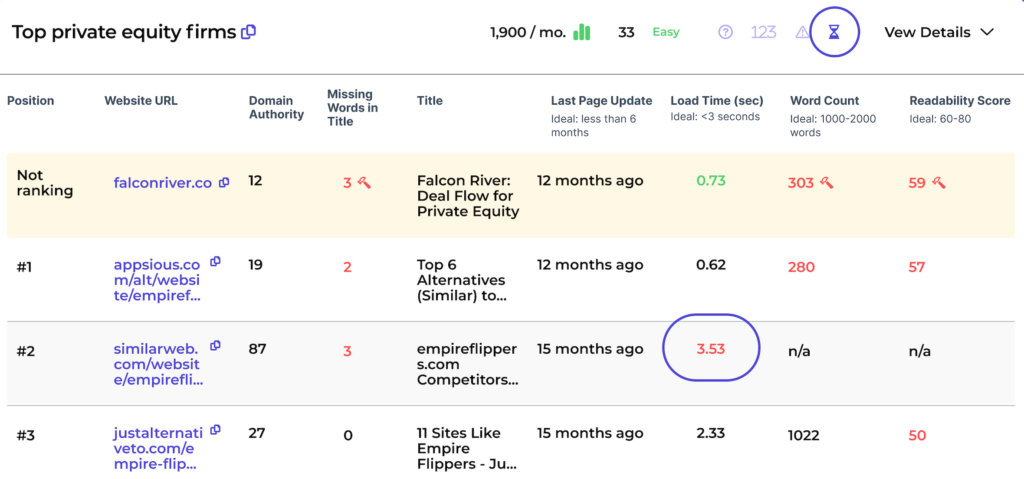
TopicRanker Pricing:
- Starter: $9/month
- Basic: $59/month
- Premium: $129/month
Semrush (4.5/5 stars)
Semrush is one of the most comprehensive, well-known keyword tools out there – and it comes with a high price tag. That said, the general consensus seems to be that the software is well worth the cost. Here are the main TLDRs:
| Semrush Pros | Semrush Cons |
|
|
Semrush User Ratings: 4.5 stars on G2 (1866 reviews)
When you search for a keyword in Semrush, you’re provided with a wealth of information, including search volume, search intent, common variations of the keyword, related FAQs, and estimated CPC.
Another place where Semrush really excels is their competitor research tool, which allows you to gain insights into what your competitors are doing, what keywords they rank for, and gaps in their content that you might be able to capitalize on.
Semrush Pricing:
- Pro: $129.95/month
- Guru: $249.95/month
- Business: $499.95/month
Seomator (3.4/5 stars)
Seomator is a platform that offers a variety of features, including keyword research, backlink exploration, rank tracking, and SEO audits. The interesting thing is that they offer a very simplified keyword research tool 100% free. Here are the main TLDRs:
| Seomator Pros | Seomator Cons |
|
|
Seomator User Ratings: 3.4 stars on G2 (18 reviews)
All you have to do is input your keyword into their tool, and it’ll return a list of related keywords with search volume, difficulty, and CPC.
Now, as mentioned, this tool is extremely simplified and doesn’t really provide a lot of keyword data. You’ll need to actually pay for the tool to get access to more insights. But if you just need a quick list of keywords for a starting point, this is a neat tool to try out.
Seomator Pricing:
- Lite: $49/month
- Standard: $99/month
- Advanced: $279/month
Keywords Everywhere (4.6/5 stars)
Keywords Everywhere is a browser extension, not a web-based application, so in a lot of ways it’s not even really comparable to Long Tail Pro. That’s why it’s so much cheaper than other alternatives on our list. Here are the main TLDRs:
| Keywords Everywhere Pros | Keywords Everywhere Cons |
|
|
Keywords Everywhere User Ratings: 4.6 out of 5 stars on Google Web Store
That said, we’re including it as an honorable mention because it’s still a decent tool for finding long tail keywords – it just doesn’t really offer much of anything beyond that.
Keywords Everywhere Pricing:
- Bronze: $1.25/month
- Silver: $5/month
- Gold: $20/month
- Platinum: $80/month
Wincher (4.8/5 stars)
Wincher is a rank tracking tool that’s especially useful if you’re a local business. They’re local rank tracking allows you to measure your keyword performance in 10,000+ locations across 180 countries. Here are the main TLDRs:
| Wincher Pros | Wincher Cons |
|
|
Wincher User Ratings: 4.8 stars on G2 (70 reviews)
Rank tracking is its speciality, though it does offer some other features, including a simplified keyword research tool. But these aren’t at the forefront of what Wincher does, so you may find that these features are a bit lacking.
Wincher Pricing:
- Starter: $39/month
- Business: $74/month
- Enterprise: $289/month
Keysearch (4/5 stars)
Starting at just $17 per month (and you can easily get that down to around $14 per month by using someone’s affiliate code), Keysearch is one of the cheapest keyword tools out there. Here are the main TLDRs:
| Keysearch Pros | Keysearch Cons |
|
|
Keysearch User Ratings: 4 out of 5 stars on Blog Pioneer
But cheaper isn’t always better. You get what you pay for, and there seem to be a lot of keyword data discrepancies when compared to other, more expensive, tools.
I’ve used it extensively, and while I think it’s fine for very basic keyword research, you shouldn’t take the data it spits out as gospel.
Aside from actual keyword research, Keysearch also offers competitive analysis, rank tracking, and a content assistant (though, I will say this particular feature is very unintuitive and kind of clunky).
Keysearch Pricing:
- Starter: $17/month
- Pro: $34/month
KWFinder (4.5/5 stars)
KWFinder is a tool by Mangools, who also has a bunch of other useful tools including SERPChecker, LinkMiner, and SiteProfiler. Here are the main TLDRs:
| KWFinder Pros | KWFinder Cons |
|
|
KWFinder User Ratings: 4.5 stars on G2 (8 reviews)
KWFinder is a pretty standard keyword research platform. When you search for a keyword, you’ll see who is ranking for the term, plus the standard metrics like search volume, difficulty, CPC, and expected value.
Overall, it’s a decent choice for traditional long tail keyword research.
KWFinder Pricing:
- Entry: $29/month
- Basic: $49/month
- Premium: $69/month
- Agency: $129/month
SE Ranking (4.8/5 stars)
SE Ranking is not just a keyword research platform, but a powerful SEO tool that offers everything from site audits to competitor and backlink analysis. Here are the main TLDRs:
| SE Ranking Pros | SE Ranking Cons |
|
|
SE Ranking User Ratings: 4.8 stars on G2 (1244 reviews)
They have two features in particular that are super helpful. The first is the keyword suggestion tool. Start by plugging in your domain, and the tool will analyze your site’s topics and spit out keywords you can target as well as keywords your competitors are targeting.
It also has a keyword grouping feature that identifies overlapping keywords so you’re not sifting through a long list of keywords that are nearly identical.
SE Ranking Pricing:
- Essential: $55/month
- Pro: $109/month
- Business: $239/month
Final Tips When Selecting
So, you’ve decided to ditch Long Tail Pro. There are tons of alternatives out there (even more than we listed), and sorting through all the different options and their feature sets can get overwhelming.
Here are a few tips for picking the right Long Tail Pro alternative:
- Determine your specific needs and goals: Consider things like how much content you want to produce, the ROI of previous content efforts, and how much heavy lifting you want the tool to be able to do.
- Take advantage of trial periods and demos: Many keyword tools nowadays offer free trials, or at the very least, a demo to walk you through how it works. Don’t be afraid to take advantage of these opportunities to find the perfect fit for your content needs.
- Consider feedback from other users and industry experts: It’s always nice to hear what other people are saying about a keyword tool. Sites like G2, Capterra, and TrustPilot are widely-known and usually have at least a handful of reviews to check out.
- Get clear on your budget and consider long term value: How much you’re willing to spend is going to play a key role in the value of the tool you choose. If you want more bang for your buck, expect to spend much more.
You might not land on your perfect alternative on the very first try, but this will at least give you a starting point.
It’s important to have a “test and change” mindset when it comes to these types of things. There’s nothing wrong with using a tool for a few months, realizing it isn’t what you were looking for, and switching to something else.
Recap of Top Alternatives
To recap, these are our top 8 recommendations if you’re looking for a Long Tail Pro alternative:
- Semrush: If you’re looking for a comprehensive, well-known tool
- Seomator: If you’re looking for a suite of free SEO and keyword tools
- TopicRanker: If you want to keyword suggestions based on SERP weaknesses
- Keywords Everywhere: If you’re looking for a browser extension to uncover auto suggest keywords
- Wincher: If you’re looking for primarily a rank tracker
- Keysearch: If you’re looking for an inexpensive solution
- KWFinder: If you’re looking for a tool for standard long tail keyword research
- SE Ranking: If you want keyword suggestions and grouping
Once you’ve landed on your perfect alternative, the work doesn’t stop there. Then comes the process of choosing your SEO target keywords and actually creating the content.
If your goal is to create world-class content that beats the ranking results already out there, that usually starts with competitor analysis and a detailed content brief.
TopicRanker takes a lot of the work out of the equation. The founder of Backlinko described it as the “future of keyword research.”
Here’s a walkthrough of how it finds problems and weaknesses in the SERP results:
Since these suggestions are aimed specifically at your site, you’ll have a much higher chance of ranking. Plus, you can use it to generate content briefs and outlines that you can then hand off to your writers to set them up for success.

Dmitry is the founder of TopicRanker – a software tool to find problems & weaknesses on Google search results and discover keywords you can easily rank for with your website. Over the last 10 years, Dmitry has helped 300+ brands rank #1 on Google through PR and SEO. Dmitry used PR & SEO to grow a startup from 0 to 40 million views per month, and got acquired by Google in 2014. He translated his know-how into JustReachOut.io, a SaaS tool to get covered in press and build authority backlinks without PR firms; it’s been used by 5000+ content marketers to date and was acquired in 2020.

